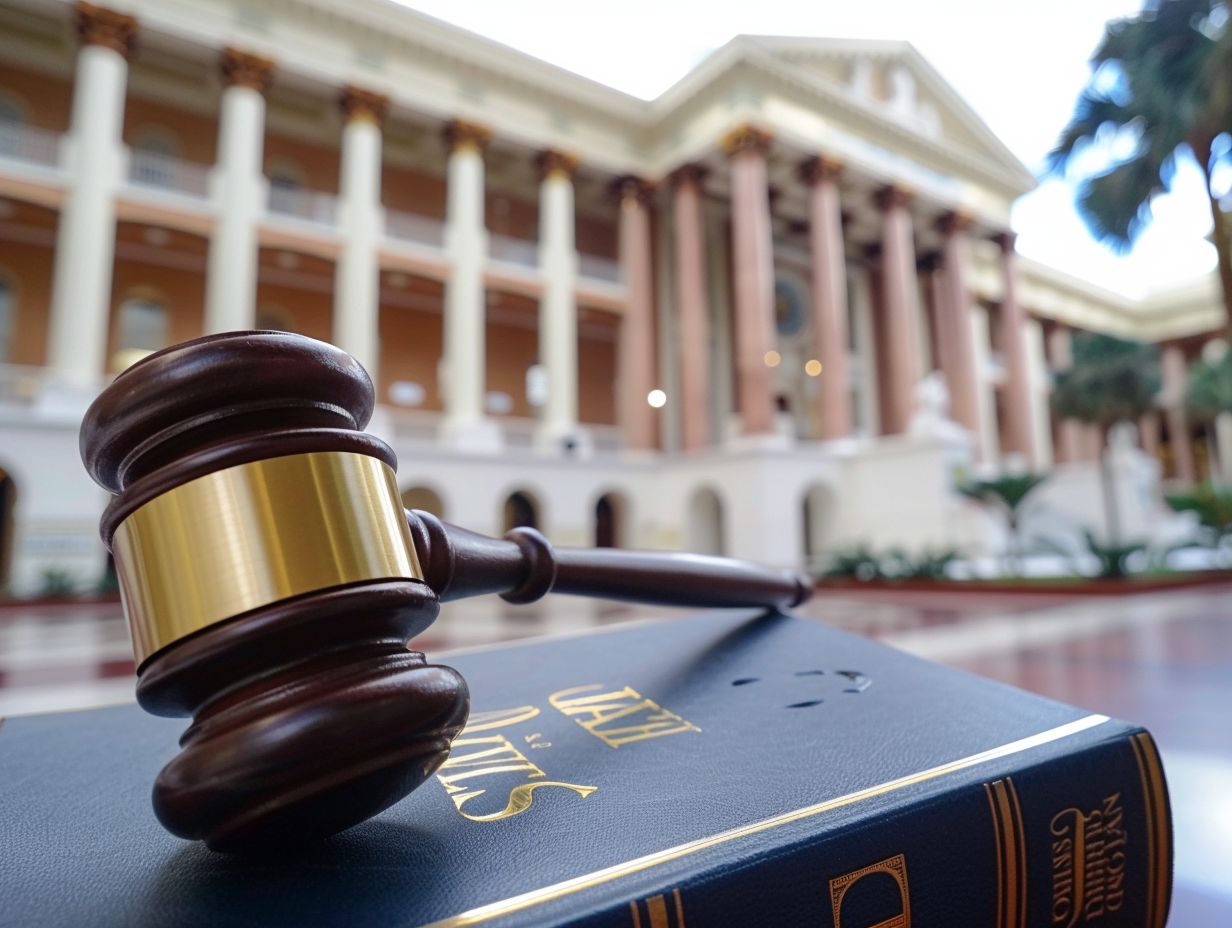Curious about how local governments operate in Florida?
Municipal law is the legal framework that governs cities, towns, villages, and special districts within the state.
In this article, we’ll explore the main components of municipal law, including local government structure, powers and duties, ordinances, and contracts.
We’ll delve into the sources of municipal law in Florida, such as the state constitution, statutes, charters, and case law.
Get ready to learn about the different types of municipalities in the Sunshine State!
Key Takeaways:

- Municipal law refers to the laws that govern local governments in Florida, including their structure, powers, and responsibilities.
- Florida’s municipal law is shaped by various sources, including the state’s constitution, statutes, municipal charters, and case law.
- There are four types of municipalities in Florida: cities, towns, villages, and special districts, each with their own unique characteristics and governing bodies.
What Is Municipal Law?
Municipal law defines the powers and responsibilities of municipalities, ensuring that they operate within the framework outlined by the state constitution and relevant legislation.
This legal framework is instrumental in delineating the extent of authority local governments possess, determining their ability to enact and enforce laws, impose taxes, and deliver essential services to residents.
Municipalities, as local governing bodies, utilize municipal law to establish zoning regulations, building codes, and public safety measures to maintain order and safeguard the well-being of their community members.
The relationship between municipalities and state constitutions is crucial for maintaining a balanced distribution of power, guaranteeing that local governance is consistent with broader legal principles and protects the rights of citizens and the state as a whole.
What Are the Main Components of Municipal Law?
The primary components of municipal law include the organization of municipal government, the responsibilities and authority granted to local government bodies, the establishment and implementation of municipal ordinances, and the administration of municipal contracts.
1. Local Government Structure
Local government structures typically consist of elected officials, such as mayors and council members, alongside appointed administrators and clerks responsible for day-to-day operations.
Elected officials have a key role in representing community interests and making policy decisions. They are answerable to residents and oversee budget priorities, ordinance approvals, and city program implementations. On the other hand, appointed administrators, such as city managers or administrators, act as executive leaders who execute policies outlined by elected officials.
They manage city departments, implement municipal projects, and ensure efficient service delivery. Clerks, in their administrative capacity, are responsible for record-keeping, maintaining public records, and supporting local government meetings by providing essential documentation and logistical support.
2. Powers and Duties of Local Government
Local governments are delegated with particular powers and responsibilities to deliver municipal services and advance public welfare within their areas.
These duties typically involve overseeing services like waste management, water supply, transportation infrastructure, public safety, and recreational facilities. Local governments have a vital function in upholding zoning regulations, building codes, and other ordinances to preserve living standards and guarantee public safety.
They commonly introduce initiatives and policies aimed at community development, affordable housing, healthcare accessibility, and environmental sustainability to improve the welfare of their inhabitants.
3. Municipal Ordinances
Municipal ordinances are local laws enacted by the governing body of a municipality to regulate activities within its boundaries.
These ordinances play a crucial role in maintaining order and addressing specific concerns that are unique to each community. The process of creating municipal ordinances typically involves drafting proposals, public hearings for community input, reviews by legal experts, and finally, approval by the municipal council or similar body.
The subject matter covered by these ordinances can range from zoning regulations, noise control, building codes, to public health and safety measures. By enforcing these ordinances, local government ensures that residents abide by the established rules, fostering a harmonious and organized environment for all.
4. Municipal Contracts
Municipal contracts are agreements in which municipalities use public funds to acquire services or goods. These contracts often undergo performance audits to ensure accountability.
These contracts are essential for the efficient operation of local governments as they establish terms and conditions for various services like construction, waste management, and public transport.
During the procurement process, municipalities assess potential suppliers based on factors such as cost-effectiveness, quality, and compliance with regulations.
After a contract is awarded, performance audits are conducted as a monitoring tool. These audits evaluate whether the services agreed upon are being delivered according to the contract terms and if public funds are being used responsibly.
This oversight is crucial in ensuring that taxpayers’ money is spent effectively and that service providers fulfill their obligations to the municipality.
What Are the Sources of Municipal Law in Florida?
Municipal law in Florida is based on various sources, such as the Florida Constitution, Florida Statutes, municipal charters, and case law. These sources collectively define the powers and responsibilities of local governments.
1. Florida Constitution
The Florida Constitution establishes the legal framework for the powers and responsibilities of municipalities within the state.
One important aspect of the Florida Constitution is the delegation of powers to municipalities, giving them the autonomy to govern specific local issues. This enablement enables cities and towns to create laws, impose taxes, and oversee public services within their jurisdiction.
The constitution defines the interactions between the state and local governments by specifying the limits of their individual powers. This arrangement ensures a system of checks and balances, preventing any level of government from exceeding its authority and encroaching on the rights and duties of the other.
2. Florida Statutes
The Florida Statutes are laws enacted by the state Legislature that impact local government operations and the exercise of municipal powers.
These statutes are instrumental in shaping municipal law by offering guidelines and regulations for various aspects of local governance.
Key areas addressed include zoning regulations, land use planning, public safety measures, taxation, and the formation of municipal entities.
Through these statutes, the state Legislature establishes frameworks that municipalities are required to follow, ensuring consistency and uniformity in governance across different local regions.
By defining the extent of municipal authority and detailing decision-making procedures, Florida Statutes assist in upholding order and efficiency in local government activities.
3. Municipal Charters
Municipal charters serve as the governing documents for municipalities, outlining the structure, powers, and functions of the local governing body.
These charters are crucial in defining the relationship between the local government and its citizens. They establish the framework within which decisions are made regarding services, taxes, zoning regulations, and other key aspects of community life.
Typical contents of municipal charters include provisions on the form of government, the distribution of authority among various branches or officials, election procedures, and the processes for amending the charter itself. By setting these parameters, municipal charters act as a guiding framework for the organization and operation of local governments, ensuring accountability and transparency in governance.
4. Case Law
Legal precedents established through court decisions, known as case law, are instrumental in interpreting statutes and municipal charters, thereby influencing the implementation of municipal law.
These judicial precedents serve as a reference point for local governments in dealing with diverse legal issues and making decisions that impact their communities.
By analyzing the outcomes of past cases, municipalities can gain insights into how the law pertains to specific circumstances, ensuring uniformity and equity in governance.
Case law delineates parameters and standards for municipal officials as they tackle intricate issues like land use regulations, zoning ordinances, and administrative procedures. It acts as a guide for the evolving realm of municipal law, mirroring societal shifts and emerging complexities.
What Are the Different Types of Municipalities in Florida?
In Florida, municipalities are classified into different types such as cities, towns, villages, and special districts, each with unique characteristics and governance structures.
1. Cities
Municipalities in Florida commonly take the form of cities, which are typically characterized by a structured municipal government that offers a wide array of services to residents. These urban centers play a crucial role in local governance, overseeing functions such as public safety, transportation, waste management, and zoning regulations.
City councils, consisting of elected officials, often make key policy decisions and allocate funds for various projects. Cities act as hubs for economic activity, cultural events, and community engagement, influencing the overall quality of life for their residents. The services provided by cities can vary significantly, ranging from maintaining parks and recreational facilities to managing utilities and public works projects.
2. Towns
Towns in Florida are smaller municipalities with a governing body that oversees community affairs and local government functions.
These towns often exhibit a close-knit community feel, where residents actively engage in decision-making processes. The governance model in towns typically involves a town council or board of selectmen that administers public services, enacts ordinances, and manages town budgets.
Local government functions in towns can vary but commonly include maintaining public infrastructure such as roads, parks, and utilities, as well as providing essential services like police, fire protection, and waste management.
Towns often prioritize fostering a sense of belonging and civic responsibility among residents through community events and volunteer opportunities.
3. Villages
Villages are a distinct type of municipality in Florida, with a focus on preserving a tight-knit community atmosphere and delivering essential local governance.
These villages often possess characteristics that distinguish them from larger cities. Their commitment to community involvement is demonstrated through various social events and gatherings that unite residents.
The local governance structure in villages tends to be more personalized, allowing residents direct engagement in decision-making processes via town hall meetings and community forums. This grassroots method cultivates a deep sense of community and responsibility among villagers, establishing a supportive and interconnected environment for all residents.
4. Special Districts
Special districts are governmental entities that are created by special law in Florida to provide specific services within a defined area.
These districts can provide a variety of services including water and sewer, fire protection, public transportation, and waste management. The process of establishing a special district usually involves a petition from residents or property owners in the area who seek to create the district to address a specific need.
Once established, these districts generally have their own governing board and may impose taxes or fees to finance the services they offer. Special districts are important for addressing localized needs and ensuring the effective delivery of essential services to the community.
Frequently Asked Questions
What is Florida’s Municipal Law?
Florida’s Municipal Law is a set of laws and regulations that govern the operations of cities, towns, and other local governments within the state of Florida.
What types of entities are covered under Florida’s Municipal Law?
Florida’s Municipal Law covers cities, towns, villages, counties, and other local governments, including special districts such as school districts and water management districts.
What are the key areas governed by Florida’s Municipal Law?
Florida’s Municipal Law covers a wide range of areas, including land use and zoning, taxation, public safety, environmental regulations, and municipal contracts and purchasing.
How does Florida’s Municipal Law differ from state law?
Florida’s Municipal Law is specific to local governments within the state, while state law applies to the entire state. Municipal law may have its own unique provisions and regulations that differ from state law.
What is the role of elected officials in Florida’s Municipal Law?
Elected officials, such as mayors and city council members, are responsible for implementing and enforcing Florida’s Municipal Law within their local jurisdiction. They also have the power to amend or create new local ordinances to address specific needs of their community.
What rights do citizens have under Florida’s Municipal Law?
Citizens have the right to participate in local government decision-making processes, attend public meetings, and access public records under Florida’s Municipal Law. They also have the right to challenge local government actions if they believe their rights have been violated.


























Rate this article:
Average rating 0 / 5. Vote count: 0
No votes so far! Be the first to rate this post.
No Comments yet!